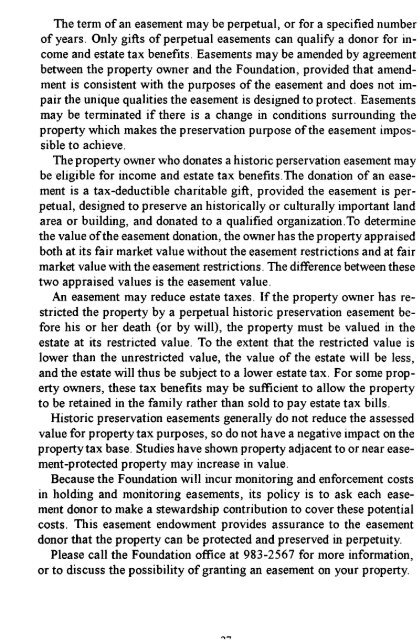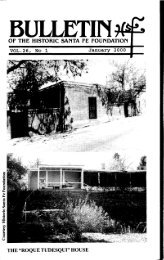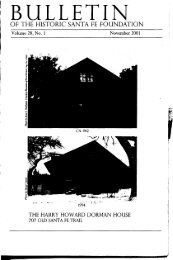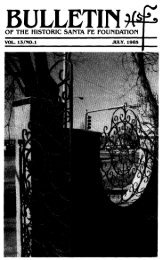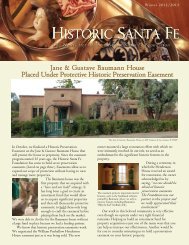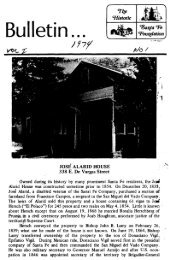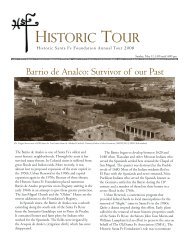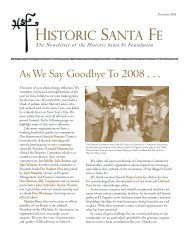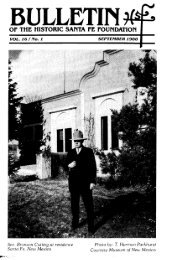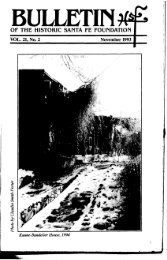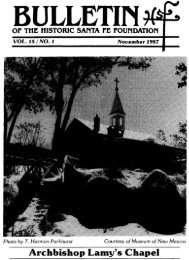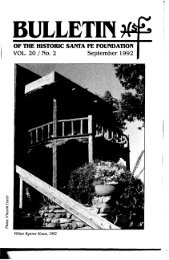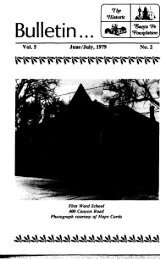James L. Johnson House - Historic Santa Fe Foundation
James L. Johnson House - Historic Santa Fe Foundation
James L. Johnson House - Historic Santa Fe Foundation
Create successful ePaper yourself
Turn your PDF publications into a flip-book with our unique Google optimized e-Paper software.
The term of an easement may be perpetual, or for a specified number<br />
of years. Only gifts of perpetual easements can qualify a donor for income<br />
and estate tax benefits. Easements may be amended by agreement<br />
between the property owner and the <strong>Foundation</strong>, provided that amendment<br />
is consistent with the purposes of the easement and does not impair<br />
the unique qualities the easement is designed to protect. Easements<br />
may be terminated if there is a change in conditions surrounding the<br />
property which makes the preservation purpose of the easement impossible<br />
to achieve.<br />
The property owner who donates a historic perservation easement may<br />
be eligible for income and estate tax benefits.The donation of an easement<br />
is a tax-deductible charitable gift, provided the easement is perpetual,<br />
designed to preserve an historically or culturally important land<br />
area or building, and donated to a qualified organization. To determine<br />
the value ofthe easement donation, the owner has the property appraised<br />
both at its fair market value without the easement restrictions and at fair<br />
market value with the easement restrictions. The difference between these<br />
two appraised values is the easement value.<br />
An easement may reduce estate taxes. If the property owner has restricted<br />
the property by a perpetual historic preservation easement before<br />
his or her death (or by will), the property must be valued in the<br />
estate at its restricted value. To the extent that the restricted value is<br />
lower than the unrestricted value, the value of the estate will be less,<br />
and the estate will thus be subject to a lower estate tax. For some property<br />
owners, these tax benefits may be sufficient to allow the property<br />
to be retained in the family rather than sold to pay estate tax bills.<br />
<strong>Historic</strong> preservation easements generally do not reduce the assessed<br />
value for property tax purposes, so do not have a negative impact on the<br />
propertytax base. Studies have shown property adjacent to or near easement-protected<br />
property may increase in value.<br />
Because the <strong>Foundation</strong> will incur monitoring and enforcement costs<br />
in holding and monitoring easements, its policy is to ask each easement<br />
donor to make a stewardship contribution to cover these potential<br />
costs. This easement endowment provides assurance to the easement<br />
donor that the property can be protected and preserved in perpetuity.<br />
Please call the <strong>Foundation</strong> office at 983-2567 for more information,<br />
or to discuss the possibility of granting an easement on your property.


